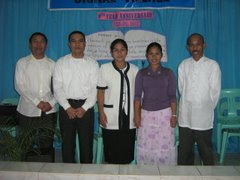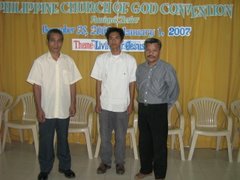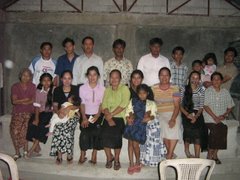Self-Denial
"And he said to them all, If any man will come after me, let him deny himself, and take up his cross daily, and follow me." Luke 9:23
1. It has been frequently imagined, that the direction here given related chiefly, if not wholly, to the Apostles; at least, to the Christians of the first ages, or those in a state of persecution. But this is a grievous mistake; For although our blessed Lord is here directing his discourse more immediately to his Apostles, and those other disciples who attended him in the days of his flesh; yet, in them he speaks to us, and to all mankind, without any exception or limitation. The very reason of the thing puts it beyond dispute, that the duty which is here enjoined is not peculiar to them, or to the Christians of the early ages. It no more regards any particular order of men, or particular time, than any particular country. No: It is of the most universal nature, respecting all times, and all persons, yea, and all things; not meats and drinks only, and things pertaining to the senses. The meaning is, "If any man," of whatever rank, station, circumstances, in any nation, in any age of the world, "will" effectually "come after me, let him deny himself" in all things; let him "take up his cross" of whatever kind; yea, and that "daily; and follow me."
2. The denying ourselves and the taking up our cross, in the full extent of the expression, is not a thing of small concern: It is not expedient only, as are some of the circumstantials of religion; but it is absolutely, indispensably necessary, either to our becoming or continuing his disciples. It is absolutely necessary, in the very nature of the thing, to our coming after Him and following Him; insomuch that, as far as we do not practise it, we are not his disciples. If we do not continually deny ourselves, we do not learn of Him, but of other masters. If we do not take up our cross daily, we do not come after Him, but after the world, or the prince of the world, or our own fleshly mind. If we are not walking in the way of the cross, we are not following Him; we are not treading in his steps; but going back from, or at least wide of, Him.
3. It is for this reason, that so many Ministers of Christ, in almost every age and nation, particularly since the Reformation of the Church from the innovations and corruptions gradually crept into it, have wrote and spoke so largely on this important duty, both in their public discourses and private exhortations. This induced them to disperse abroad many tracts upon the subject; and some in our own nation. They knew both from the oracles of God, and from the testimony of their own experience, how impossible it was not to deny our Master, unless we will deny ourselves; and how vainly we attempt to follow Him that was crucified, unless we take up our cross daily.
4. But may not this very consideration make it reasonable to inquire, If much has been said and wrote on the subject already, what need is there to say or write any more? I answer, There are no inconsiderable numbers, even of people fearing God, who have not had the opportunity either of hearing what has been spoke, or reading what has been wrote, upon it. And, perhaps, if they had read much of what has been written, they would not have been so much profited. Many who have wrote, (some of them large volumes,) do by no means appear to have understood the subject. Either they had imperfect views of the very nature of it, (and then they could never explain it to others,) or they were unacquainted with the due extent of it; they did not see how exceeding broad this command is; or they were not sensible of the absolute, the indispensable necessity of it. Others speak of it in so dark, so perplexed, so intricate, so mystical a manner, as if they designed rather to conceal it from the vulgar, than to explain it to common readers. Others speak admirably well, with great clearness and strength, on the necessity of self-denial; but then they deal in generals only, without coming to particular instances, and so are of little use to the bulk of mankind, to men of ordinary capacity and education. And if some of them do descend to particulars, it is to those particulars only which do not affect the generality of men, since they seldom, if ever, occur in common life; -- such as the enduring imprisonment, or tortures; the giving up, in a literal sense, their houses or lands, their husbands or wives, children, or life itself; to none of which we are called, nor are likely to be, unless God should permit times of public persecution to return. In the meantime, I know of no writer in the English tongue who has described the nature of self-denial in plain and intelligible terms, such as lie level with common understandings, and applied it to those little particulars which daily occur in common life. A discourse of this kind is wanted still; and it is wanted the more, because in every stage of the spiritual life, although there is a variety of particular hinderances of our attaining grace or growing therein, yet are all resolvable into these general ones, -- either we do not deny ourselves, or we do not take up our cross.
In order to supply this defect in some degree, I shall endeavour to show, First, what it is for a man to deny himself, and what to take up his cross; and, Secondly, that if a man be not fully Christ's disciple, it is always owing to the want of this.
I. 1. I shall, First, endeavour to show, what it is for a man to "deny himself, and take up his cross daily." This is a point which is, of all others, most necessary to be considered and throughly understood, even on this account, that it is, of all others, most opposed by numerous and powerful enemies. All our nature must certainly rise up against this, even in its own defence; the world, consequently, the men who take nature, not grace, for their guide, abhor the very sound of it. And the great enemy of our souls, well knowing its importance, cannot but move every stone against it. But this is not all: Even those who have in some measure shaken off the yoke of the devil, who have experienced, especially of late years, a real work of grace in their hearts, yet are no friends to this grand doctrine of Christianity, though it is so peculiarly insisted on by their Master. Some of them are as deeply and totally ignorant concerning it, as if there was not one word about it in the Bible. Others are farther off still, having unawares imbibed strong prejudices against it. These they have received partly from outside Christians, men of a fair speech and behaviour, who want nothing of godliness but the power, nothing of religion but the spirit; -- and partly from those who did once, if they do not now, "taste of the powers of the world to come." But are there any of these who do not both practise self-denial themselves, and recommend it to others? You are little acquainted with mankind, if you doubt of this. There are whole bodies of men who only do not declare war against it. To go no farther than London: Look upon the whole body of Predestinarians, who by the free mercy of God have lately been called out of the darkness of nature into the light of faith. Are they patterns of self-denial? How few of them even profess to practise it at all! How few of them recommend it themselves, or are pleased with them that do! Rather, do they not continually represent it in the most odious colours, as if it were seeking "salvation by works," or seeking "to establish our own righteousness?" And how readily do Antinomians of all kinds, from the smooth Moravian, to the boisterous, foul-mouthed Ranter, join the cry, with their silly, unmeaning cant of legality, and preaching the law! Therefore you are in constant danger of being wheedled, hectored, or ridiculed out of this important gospel-doctrine, either by false teachers, or false brethren, (more or less beguiled from the simplicity of the gospel,) if you are not deeply grounded therein. Let fervent prayer, then, go before, accompany, and follow what you are now about to read, that it may be written in your heart by the finger of God, so as never to be erased.
2. But what is self-denial? Wherein are we to deny ourselves? And whence does the necessity of this arise? I answer, The will of God is the supreme, unalterable rule for every intelligent creature; equally binding every angel in heaven, and every man upon earth. Nor can it be otherwise: This is the natural, necessary result of the relation between creatures and their Creator. But if the will of God be our one rule of action in every thing, great and small, it follows, by undeniable consequence, that we are not to do our own will in anything. Here, therefore, we see at once the nature, with the ground and reason, of self-denial. We see the nature of self-denial: It is the denying or refusing to follow ours own will, from a conviction that the will of God is the only rule of action to us. And we see the reason thereof, because we are creatures; because "it is he that hath made us, and not we ourselves."
3. This reason for self-denial must hold, even with regard to the angels of God in heaven; and with regard to man, innocent and holy, as he came out of the hands of his Creator. But a farther reason for it arises from the condition wherein all men are since the Fall. We are all now "shapen in wickedness, and in sin did our mother conceive us." Our nature is altogether corrupt, in every power and faculty. And our will, depraved equally with the rest, is wholly bent to indulge our natural corruption. On the other hand, it is the will of God that we resist and counteract that corruption, not at some times, or in some things only, but at all times and in all things. Here, therefore, is a farther ground for constant and universal self-denial.
4. To illustrate this a little further: The will of God is a path leading straight to God. The will of man, which once ran parallel with it, is now another path, not only different from it, but in our present state, directly contrary to it: It leads from God. If, therefore, we walk in the one, we must necessarily quit the other. We cannot walk in both. Indeed, a man of faint heart and feeble hands may go in two ways, one after the other. But he cannot walk in two ways at the same time: He cannot, at one and the same time, follow his own will, and follow the will of God: He must choose the one or the other; denying God's will, to follow his own; or denying himself, to follow the will of God.
5 . Now, it is undoubtedly pleasing, for the time, to follow our own will, by indulging, in any instance that offers, the corruption of our nature: But by following it in anything, we so far strengthen the perverseness of our will; and by indulging it, we continually increase the corruption of our nature. So, by the food which is agreeable to the palate, we often increase a bodily disease: It gratifies the taste, but it inflames the disorder. it brings pleasure, but it also brings death.
6. On the whole, then, to deny ourselves, is, to deny our own will, where it does not fall in with the will of God; and that however pleasing it may be. It is, to deny ourselves any pleasure which does not spring from, and lead to, God; that is, in effect, to refuse going out of our way, though into a pleasant, flowery path; to refuse what we know to be deadly poison, though agreeable to the taste.
7. And every one that would follow Christ, that would be his real disciple, must not only deny himself, but take up his cross also. A cross is anything contrary to our will, anything displeasing to our nature. So that taking up our cross goes a little farther than denying ourselves; it rises a little higher, and is a more difficult task to flesh and blood; -- it being more easy to forego pleasure, than to endure pain.
8. Now, in running "the race which is set before us," according to the will of God, there is often a cross lying in the way; that is, something which is not only not joyous, but grievous; something which is contrary to our will, which is displeasing to our nature. What then is to be done? The choice is plain: Either we must take up our cross, or we must turn aside from the way of God, "from the holy commandment delivered to us;" if we do not stop altogether, or turn back to everlasting perdition!
9. In order to the healing of that corruption, that evil disease, which every man brings with him into the world, it is often needful to pluck out, as it were, a right eye, to cut off a right hand; -- so painful is either the thing itself which must be done, or the only means of doing it; the parting, suppose, with a foolish desire, with an inordinate affection; or a separation from the object of it, without which it can never be extinguished. In the former kind, the tearing away such a desire or affection, when it is deeply rooted in the soul, is often like the piercing of a sword, yea, like "the dividing asunder of the soul and spirit, the joints and marrow." The Lord then sits upon the soul as a refiner's fire, to burn all the dross thereof. And this is a cross indeed; it is essentially painful; it must be so, in the very nature of the thing. The soul cannot be thus torn asunder, it cannot pass through the fire, without pain.
10. In the latter kind, the means to heal a sin-sick soul, to cure a foolish desire, an inordinate affection, are often painful, not in the nature of the thing, but from the nature of the disease. So when our Lord said to the rich young man, "Go, sell that thou hast, and give it to the poor," (as well knowing, this was the only means of healing his covetousness,) the very thought of it gave him so much pain, that "he went away sorrowful;" choosing rather to part with his hope of heaven, than his possessions on earth. This was a burden he could not consent to lift, a cross he would not take up. And in the one kind or the other, every follower of Christ will surely have need to "take up his cross daily."
11. The "taking up" differs a little from "bearing his cross." We are then properly said to "bear our cross," when we endure what is laid upon us without our choice, with meekness and resignation. Whereas, we do not properly "take up our cross," but when we voluntarily suffer what it is in our power to avoid; when we willingly embrace the will of God, though contrary to our own; when we choose what is painful, because it is the will of our wise and gracious Creator.
12. And thus it behoves every disciple of Christ to take up, as well as to bear, his cross. Indeed, in one sense, it is not his alone; it is common to him, and many others; seeing there is no temptation befals any man, ei mh anqrvpinos, -- "but such as is common to men;" such as is incident and adapted to their common nature and situation in the present world. But, in another sense, as it is considered with all its circumstances, it is his; peculiar to himself: It is prepared of God for him; it is given by God to him, as a token of his love. And if he receives it as such, and, after using such means to remove the pressure as Christian wisdom directs, lies as clay in the potter's hand; it is disposed and ordered by God for his good, both with regard to the quality of it, and in respect to its quantity and degree, its duration, and every other circumstance.
13. In all this, we may easily conceive our blessed Lord to act as the Physician of our souls, not merely "for his own pleasure, but for our profit, that we may be partakers of his holiness." If, in searching our wounds, he puts us to pain, it is only in order to heal them. He cuts away what is putrified or unsound, in order to preserve the sound part. And if we freely choose the loss of a limb, rather than the whole body should perish; how much more should we choose, figuratively, to cut off a right hand, rather than the whole soul should be cast into hell!
14. We see plainly then both the nature and ground of taking up our cross. It does not imply the disciplining ourselves; (as some speak;) the literally tearing our own flesh: the wearing hair-cloth, or iron-girdles, or anything else that would impair our bodily health; (although we know not what allowance God may make for those who act thus through involuntary ignorance;) but the embracing the will of God, though contrary to our own; the choosing wholesome, though bitter medicines; the freely accepting temporary pain, of whatever kind, and in whatever degree, when it is either essentially or accidentally necessary to eternal pleasure.
II. 1. I am, Secondly, to show, that it is always owing to the want either of self-denial, or taking up his cross, that any man does not throughly follow Him, is not fully a disciple of Christ.
It is true, this may be partly owing, in some cases, to the want of the means of grace; of hearing the true word of God spoken with power; of the sacraments, or of Christian fellowship. But where none of these is wanting, the great hindrance of our receiving or growing in the grace of God is always the want of denying ourselves, or taking up our cross.
2. A few instances will make this plain. A man hears the word which is able to save his soul: He is well pleased with what he hears, acknowledges the truth, and is a little affected by it; yet he remains "dead in trespasses and sins," senseless and unawakened. Why is this? Because he will not part with his bosom-sin, though he now knows it is an abomination to the Lord. He came to hear, full of lust and unholy desires; and he will not part with them. Therefore no deep impression is made upon him, but his foolish heart is still hardened: That is, he is still senseless and unawakened, because he will not deny himself.
3. Suppose he begins to awake out of sleep, and his eyes are a little opened, why are they so quickly closed again? Why does he again sink into the sleep of death? Because he again yields to his bosom-sin; he drinks again of the pleasing poison. Therefore it is impossible that any lasting impression should be made upon his heart: That is, he relapses into his fatal insensibility, because he will not deny himself.
4. But this is not the case with all. We have many instances of those who when once awakened sleep no more. The impressions once received do not wear away: They are not only deep, but lasting. And yet, many of these have not found what they seek: They mourn, and yet are not comforted. Now, why is this? It is because they do not "bring forth fruits meet for repentance;" because they do not, according to the grace they have received, "cease from evil, and do good." They do not cease from the easily besetting sin, the sin of their constitution, of their education, or of their profession; or they omit doing the good they may, and know they ought to do, because of some disagreeable circumstance attending it: That is, they do not attain faith, because they will not "deny themselves," or "take up their cross."
5. But this man did receive "the heavenly gift;" he did "taste of the powers of the world to come;" he saw "the light of the glory of God in the face of Jesus Christ;" the "peace which passeth all understanding" did "rule his heart and mind; and "the love of God was shed abroad" therein, "by the Holy Ghost which was given unto him;" -- yet he is now weak as another man; he again relishes the things of earth, and has more taste for the things which are seen than for those which are not seen; the eye of his understanding is closed again, so that he cannot "see Him that is invisible;" his love is waxed cold, and the peace of God no longer rules in his heart. And no marvel: for he has again given place to the devil, and grieved the Holy Spirit of God. He has turned again unto folly, to some pleasing sin, if not in outward act, yet in heart. He has given place to pride, or anger, or desire, to self-will, or stubbornness. Or he did not stir up the gift of God which was in him; he gave way to spiritual sloth, and would not be at the pains of "praying always, and watching thereunto with all perseverance:" That is, he made shipwreck of the faith, for want of self-denial, and taking up his cross daily.
6. But perhaps he has not made shipwreck of the faith: He has still a measure of the Spirit of adoption, which continues to witness with his spirit that he is a child of God. However, he is not "going on to perfection;" he is not, as once, hungering and thirsting after righteousness, panting after the whole image and full enjoyment of God, as the hart after the water-brook. Rather he is weary and faint in his mind, and, as it were, hovering between life and death. And why is he thus, but because he hath forgotten the word of God, -- "By works is faith made perfect?" He does not use all diligence in working the works of God. He does not "continue instant in prayer," private as well as public; in communicating, hearing, meditation, fasting, and religious conference. If he does not wholly neglect some of these means, at least he does not use them all with his might. Or he is not zealous of works of charity, as well as works of piety. He is not merciful after his power, with the full ability which God giveth. He does not fervently serve the Lord by doing good to men, in every kind and in every degree he can, to their souls as well as their bodies. And why does he not continue in prayer? Because in time of dryness it is pain and grief unto him. He does not continue in hearing at all opportunities, because sleep is sweet; or it is cold, or dark, or rainy. But why does he not continue in works of mercy? Because he cannot feed the hungry, or clothe the naked, unless he retrench the expense of his own apparel, or use cheaper and less pleasing food. Beside which, the visiting the sick, or those that are in prison, is attended with many disagreeable circumstances. And so are most works of spiritual mercy; reproof, in particular. He would reprove his neighbour; but sometimes shame, sometimes fear, comes between: For he may expose himself, not only to ridicule, but to heavier inconveniences too. Upon these and the like considerations, he omits one or more, if not all, works of mercy and piety. Therefore, his faith is not made perfect, neither can he grow in grace; namely, because he will not deny himself, and take up his daily cross.
7. It manifestly follows, that it is always owing to the want either of self-denial, or taking up his cross, that a man does not throughly follow his Lord, that he is not fully a disciple of Christ. It is owing to this, that he who is dead in sin does not awake, though the trumpet be blown; that he who begins to awake out of sleep, yet has no deep or lasting conviction; that he who is deeply and lastingly convinced of sin does not attain remission of sins; that some who have received this heavenly gift retain it not, but make shipwreck of the faith; and that others, if they do not draw back to perdition, yet are weary and faint in their mind, and do not reach the mark of the prize of the high calling of God in Christ Jesus.
III. 1. How easily may we learn hence, that they know neither the Scripture nor the power of God, who directly or indirectly, in public or in private, oppose the doctrine of self-denial and the daily cross! How totally ignorant are these men of an hundred particular texts, as well as of the general tenor of the whole oracles of God! And how entirely unacquainted must they be with true, genuine, Christian experience; -- of the manner wherein the Holy Spirit ever did, and does at this day, work in the souls of men! They may talk, indeed, very loudly and confidently, (a natural fruit of ignorance,) as though they were the only men who understood either the word of God, or the experience of his children. but their words are, in every sense, vain words; they are weighed in the balance, and found wanting.
2. We may learn from hence, Secondly, the real cause why not only many particular persons, but even bodies of men, who were once burning and shining lights, have now lost both their light and heat. If they did not hate and oppose, they at least lightly esteemed, this precious gospel doctrine. If they did not boldly say, Abnegationem omnem proculcamus, internecioni damus-' "We trample all self-denial under foot, we devote it to destruction;" yet they neither valued it according to its high importance, nor took any pains in practising it. Hanc mystici docent, said that great, bad man: "The mystic writers teach self-denial." -- No; the inspired writers! And God teaches it to every soul who is willing to hear his voice!
3. We may learn from hence, Thirdly, that it is not enough for a Minister of the gospel not to oppose the doctrine of self-denial, to say nothing concerning it. Nay, he cannot satisfy his duty by saying a little in favour of it. If he would, indeed, be pure from the blood of all men, he must speak of it frequently and largely; he must inculcate the necessity of it in the clearest and strongest manner; he must press it with his might, on all persons, at all times, and in all places; laying "line upon line, line upon line, precept upon precept, precept upon precept:" So shall he have a conscience void of offence; so shall he save his own soul and those that hear him.
4. Lastly: See that you apply this, every one of you, to your own soul. Meditate upon it when you are in secret: Ponder it in your heart! Take care not only to understand it throughly, but to remember it to your lives' end! Cry unto the Strong for strength, that you may no sooner understand, than enter upon the practice of it. Delay not the time, but practise it immediately, from this very hour! Practise it universally, on every one of the thousand occasions which will occur in all circumstances of life! Practise it daily, without intermission, from the hour you first set your hand to the plough, and enduring therein to the end, till your spirit returns to God!
Si Bro. Rey Fabian ng Paniqui, Tarlac ang nagbigay ng Devotional na mensahe. Ang kanyang teksto ay ang Phil. 1:21. Ang pamagat ng kanyang mensahe ay "Living For Jesus". Kanyang binigyang diin na ang isang tao ay kailangang isabuhay si Kristo. Pag isinabuhay natin si Cristo lahat ng hihingin natin ay kanyang ipagkakaloob. Si Cristo ang maging halimbawa natin sa ating buhay dito sa sanglibutang ito.
Si Uncle Ollen Craig ang nagbigay ng mensahe na may Pamagat na "Spiritual check up". Sinabi niya sa kanyang mensahe na kailangan suriin natin ang ating sariling buhay espiritual. Mayron pa ba tayong gana sa espiritual na bagay? Nagbabasa pa ba tayo ng Salita ng Dios? Nanalangin pa ba tayo? Nagpapatotoo pa ba tayo.? Kailangan ingatan natin ang ating kaligtasan.
 The Sermons of John Wesley 1872 Edition
The Sermons of John Wesley 1872 Edition
 Ang ika-11 Anibersaryo ng
Ang ika-11 Anibersaryo ng  1. An ecclesiastical council is an assembly of men gathered together in the name of God, consulting and defining or settling, according to the word of God, about those things which pertain to religion and the good of the church, for the glory of God and the salvation of the church.
1. An ecclesiastical council is an assembly of men gathered together in the name of God, consulting and defining or settling, according to the word of God, about those things which pertain to religion and the good of the church, for the glory of God and the salvation of the church.



















































































































